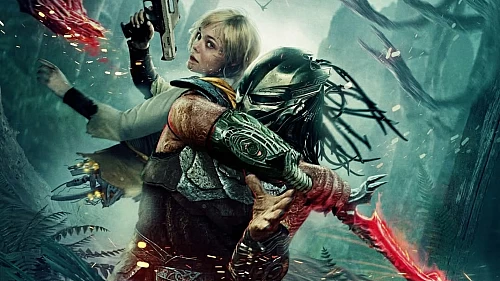This post was published by a guest. The views expressed are those of the author and do not necessarily reflect the views of Scified.com.
Science fiction (sci-fi) has long been a big stomping ground for innovative and speculative technologies. It allows creators to not only tap into wild imagination but also take what technologies are around us in our daily lives and picture how they could inspire future cutting-edge gadgets.
Sci-fi books, movies, and TV shows have always had a wonderful element of technology woven into their storylines, whether artificial intelligence going awry like in I-Robot, or simply some fantastic personal devices like the communicators in Star Trek. What has been dreamed up in fiction before has often led to technological advances in the real world.
Online Inspiration
It is easy to argue that a lot of sci-fi-inspired technology exists around us. Turning attention to being online, there are plenty of platforms today that have elements about them that have been shaped by technology from science fiction.
A good example of this can be seen at brand-new online casinos, where people can enjoy what was once exclusively an in-person activity. Instead of having to physically haul oneself to a land-based casino (as unfortunately, teleportation devices still look a long way off), players can enjoy a phenomenal range of slots and live dealer table games from wherever they are. All thanks to fast, powerful mobile technology.
Mobile technology is now everywhere, but it was dreamed up as a key component in media such as 1968’s “2001: A Space Odyssey” which featured a “Newspad”, a portable, electronic device. The popular 1970s TV Show “Space: 1999” also featured wearable two-way devices, giving the wearer a range of functionality — although online gambling at reputable licensed casinos wasn’t one of them.
AI’s Great Impact on Platforms
Having the ability to talk to AI software, which produces generative results, has become the norm. HAL 9000 in the aforementioned “2001: A Space Odyssey” is one of the all-time classic imaginings of AI and what it can look like. Since the launch of ChatGPT a couple of years ago, artificial intelligence has had an enormous influence on online platforms.
In terms of company consumerism, AI algorithms can fine-tune an individual's experience by studying what that user has purchased before. This means that it can give very specific recommendations and offers to them. That fine-tuning of personal experiences, by AI simply learning what a user is doing, is a common theme in science fiction.
In general, AI is used everywhere now, from generating fan-fiction text to helping create images, providing deep searches on topics, and even, quite impactfully, producing sci-fi movies. But it also goes deeper because users can interact directly with AI on platforms. A lot of the customer support chats that are found online now are simply AI bots doing the work.
Mobile Streaming
The thought of live streaming anything on a handheld device was almost unimaginable 30 years ago. But the race for engagement and new ways to use tech has increased by orders of magnitude since the turn of the century.
Think back to the Personal Access Display Device (PADD), which was a handheld terminal in “Star Trek: The Next Generation”. On a PADD, crew members could do anything and everything with the ship, including executing hardware functions and communicating with others.
This was innovative and a forerunner of modern tablets. Before that, the old-school communicators used in the original Star Trek series can be seen as the forerunners of today’s mobile phones. Platforms have to ensure they have full compatibility with mobile devices because people like having them at hand for all sorts of tasks, from work to leisure. Compatibility means strong, reliable streaming capabilities, full access to site functionality, and intuitive layouts to work on any screen size.
Virtual Reality (VR)
VR is still an emerging technology, but again, Star Trek: TNG and spin-off movies like Generations had a firm nod towards what it could be. Crew members would enter the special holodeck, and the onboard computer would load up a specific program that would display an immersive world that the person could explore and interact with. It’s something extremely akin to the VR systems that have emerged in the market for regular-use consumers today.
VR is projected to be one of the next big things for online platforms. Having a user step into a completely virtual casino world is impressive to think about. Players could control virtual avatars from their personal space in the real world and interact with everything from slot machines to table games, which all feel futuristic and like something out of “The Jetsons”.
Why Platforms Lean On New Technology
Online platforms have to stay relevant, and unless they are going for a very specific, niche, retro, and simple experience, the more modern a site can present itself, the better off they are likely to be. Changes will happen, and while some things are restricted by cost, a look at modern platforms just shows how easily things spread.
AI has been one of the biggest game-changers of all time, and its presence is only going to deepen. It helps in all areas, from player recommendations to fraud detection. AI now helps develop games that appear on platforms, and sites can easily track performance and security metrics to boost their business.
AI is efficient and like an automated robotic assistant seen in so many sci-fi classics. But perhaps the most interesting thing to think about is what the future will bring and how the lines between ours and sci-fi technology will blur further. How are fantastic sci-fi technologies that can be seen in current fiction, like nanotechnology, genetic enhancements, and of course, AI superintelligence, going to impact the platforms we see and use in the future?

Sci-Fi Conventions Reveal Exclusive Behind-The-Scenes Content
Fans were buzzing all week about San Diego Comic‑Con 2025 and everything it revealed. From trailers to sneak previews and creator chats, the excitem...

The Economics of Credit-Based Dating: Estimating Real Costs Before They Estimate You
Credit-based dating platforms can feel deceptively light at the door: sign up, browse profiles, get messages quickly, and only then discover that mean...

How Sci‑Fi Culture Inspired Future Tech Careers and Online Work in 2026
Explore how science fiction influences technology careers and online work in 2026, linking future tech inspiration with real opportunities and remote talent platforms.

Benefits of Using the Mobile Client: An Analysis of the 1x Casino App Download
Playing casino games on your phone should be quick, safe, and actually enjoyable (not a chore). The 1x Casino mobile client aims to package your accou...

CryptoEasily launches stable-yield cloud mining contracts, creating a new way for BTC and XRP holders to earn $7,700 per day.
As the price of Bitcoin and the value of XRP continue to decline, with Bitcoin falling below $75,000 and XRP dropping to around $1.50, market sentimen...


